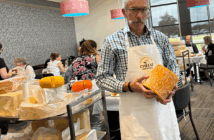By Professor Richard Newcomb, chief scientist at Plant & Food Research
Research into cellular agriculture is expanding rapidly with investors flocking to be part of this future global market. According to Barclays, the market for meat alternatives, including lab-grown real meat, could be worth around 10% of the meat industry within a decade.
Over 80 start-ups are working on cellular agriculture internationally, mainly in Singapore, the USA, and Europe. Most companies are working on red meat and chicken products, with fewer than ten focused on seafood. Growing meat or seafood in the lab involves taking cells from an organism, feeding them nutrient-rich broth, and growing them in a bioreactor.
Last year Singapore became the first country to give regulatory approval for human consumption of lab-grown chicken nuggets produced by San Francisco start-up Eat Just. In Israel, Future Meat Technologies have launched their own tasting restaurant.
Cellular seafood requires less complex nutrients and may prove cheaper and more attractive for start-ups than meat. Singapore-based Shiok Meats plans to seek regulatory approval for their seafood products soon. BlueNalu is developing cellular fish for species that are difficult to farm, overfished, or pose health risks.
While the cost of Eat Just’s lab-grown chicken is comparable to premium chicken, these products are likely to become more affordable as the technology develops. For example, the first lab-grown burger cost over NZ$400k in 2013.
A further challenge for these products, which so far have a mince-like texture, is to re-create the structure and texture of meat products, along with desirable culinary and nutritional qualities.
Lab-grown plant foods are in the pipeline too. This technology could create high-value food ingredients, fresh foods, and cosmetics. Zurich University has already produced cocoa ingredients and Finnish researchers have developed a home bioreactor.
On the local scene, researchers from the University of Auckland and Plant & Food Research are working on lab-grown meat, seafood, and plants.
Cellular agriculture is likely to be a major disruptor for our food industries. However, it’s unclear what impact these technologies and products will have on food security, sustainability, and food waste (think no by-products and reduced spoilage). It’s also unclear how consumers will react to them.
Professor Richard Newcomb is chief scientist at Plant & Food Research overseeing all aspects of science quality, strategic science, capability development and collaboration across the institute. He is also an honorary professor of evolutionary biology at the University of Auckland.





























































































